The brightness dimmed in the stadium but the action dialled up to eyes-wide-open intensity.
By Aaron Wong, Badzine Correspondent live in Sydney. Photos: Badmintonphoto (archives)
8.5
The central court lighting went out for eight and a half minutes in the second games of the opening mixed doubles matches. The contrast on the live broadcast was adjusted immediately so that international television viewers would barely notice, apart from play halting.
After the situation had been up in the air for some minutes, the players of Malaysian-Chinese mixed doubles match together decided to play on under the secondary lights. And the all-Korean personnel on the adjacent court followed suit.
Doubles: One side very sure
As they have been all week, the seven seeded Olympic silver medallists Goh Liu Ying / Chan Peng Soon (pictured) have been businesslike in their dealings with opponents of any ranking. Their deeply understood long-term partnership was paramount to overcoming China’s greener young combination Li Yinhui / Wang Zekang, 21-16, 25-23.
“This is our third or fourth time here. Australians are very warm and welcoming to us Malaysians,” remarked Chan in Mandarin at the mixed zone afterwards.
In men’s doubles, the Indonesians observed early on that their Indian opposition’s skills wouldn’t have enough bite as well as largely abstain from flat exchange rallies. First seeds Berry Angriawan / Hardianto (pictured below) decided to drive Manu Attri / Reddy Sumeeth to frustration by defending endlessly until they succumbed, 21-17, 21-15.
In a match where both sides chose to be energetic, the younger Korean World Junior champions Lee Yu Rim / Baek Ha Na (pictured bottom) yanked away the lead against first seeds Misato Aratama / Akane Watanabe.
With a multiple World Champion, Ra Kyung Min, steering their ship as coach, Lee/Baek appeared assured throughout the long rallies that their smashes were good enough to break through the Japanese armour even if it took in excess of 20 shots every time, with Lee Yu Rim being especially imposing.
By altering nothing dramatically about their proposition, the Japanese inevitably surrendered 21-16 , 21-17.
Singles: One side unsure
At the quarter-finals, three former men’s Superseries champions were devoured and today the same fate befell the remaining two who have been Grand Prix Gold titleholders, while one the 2012 French Superseries champion was chopped down in women’s singles.
In both women’s and men’s singles, it was one (or two to be exact) that got away for Hong Kong in their battles against China. To the credit of Hong Kong’s representatives, they were putting their best foot forward without any sitting coach.
Hong Kong had touched on the right strategies among the variety they tested but neither was able to settle on the right one. Unseeded Cai Yanyan (pictured) and Zhou Zeqi rode their standard stable performances to straight games victory over the patchy brilliance of Cheung Ngan Yi and Lee Cheuk Yiu respectively.
Cai beat Cheung 21-19, 21-11, by being patient through her opponent clearing out. Without a coach Cheung wasn’t aware that Cai’s footwork is probably the ‘weakness’ that can be exploited. Cai is fast enough but her recovery balance is only rough and ready.
You wouldn’t want to make Cai simply run in straight lines but instead require her to cover the court needing several changes in directions so that each one takes a few percentage points off her balance. Cheung had success on cross court smashes after moving her opponent to the back and then cross court smashing or dropping so that Cai’s feet would have to cross each other. In opting for the power game, Cheung started to punch too many shots long or wide.
Surplus energy
China’s Zhou Zeqi (pictured below) won his men’s semi, 21-14, 21-15, because he noticed over time that Lee Cheuk Yiu possessed energy in surplus which resulted in less delicacy and more unforced errors by his opponent’s on the final finishing shot of the rallies.
The upside for Lee Cheuk Yiu is that he possesses a complete enough package of technical skills and used all his gifts. Relative to his opponent, he was the one who applied deception through using the same hand production for clears and drops, altered the pace, explored the full court, and manoeuvred the other side out of position.
But like Cheung, he wasn’t able to settle on which was the winning solution. If only Lee had spent time calibrating the surplus energy in his body to enable those finishing net pushes and down the line smashes to stay in, the rest of his strategy was already looking after itself.
On the bright side
This is the type of match both Cheung and Lee need to win in future as they were entirely capable. It was less about not having a coach present and more about increasing one’s instinct on determining what’s right (like Sony Dwi Kuncoro has the ability to). Their problem to solve is crucial yet smaller than the frustration of never touching on the right solution or lacking the technical ability to translate it.
Hong Kong’s absent coach experiment was worthwhile because they went far in the tournament on their wits alone. And if the BWF ever go ahead with a non-sitting coach policy (as in tennis) then they’re ahead of the pack.
Finals line-up
WS: Cai Yanyan (CHN) vs. Ayumi Mine (JPN)
MS: Lu Guangzu (CHN) vs. Zhou Zeqi (CHN)
WD: Ayako Sakuramoto / Yukiko Takahata (JPN) [2] vs. Baek Ha Na / Lee Yu Rim (KOR) [4]
MD: Berry Angriawan / Hardianto (INA) [1] vs. Wahyu Nayaka Arya Pangkaryanira / Ade Yusuf Santoso (INA) [2]
XD: Chae Yoo Jung / Seo Seung Jae (KOR) [5] vs. Goh Liu Ying / Chan Peng Soon (MAS) [7]
Click here for complete semi-final results
![AUSTRALIAN OPEN 2018 SF – The art of knowing The brightness dimmed in the stadium but the action dialled up to eyes-wide-open intensity. By Aaron Wong, Badzine Correspondent live in Sydney. Photos: Badmintonphoto (archives) 8.5 The central court lighting […]](http://www.badzine.net/wp-content/uploads/ngg_featured/04142018-2125-CommonwealthGames2018_LVA_4161_rotator.jpg)
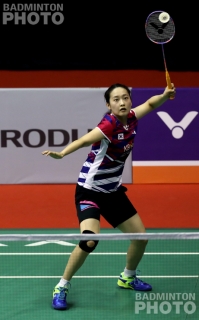
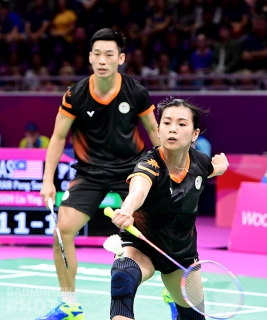
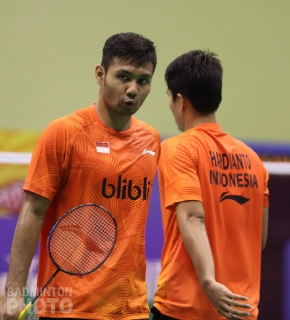
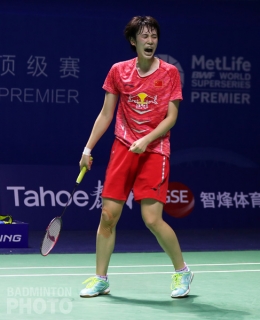
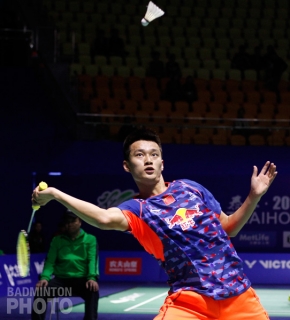
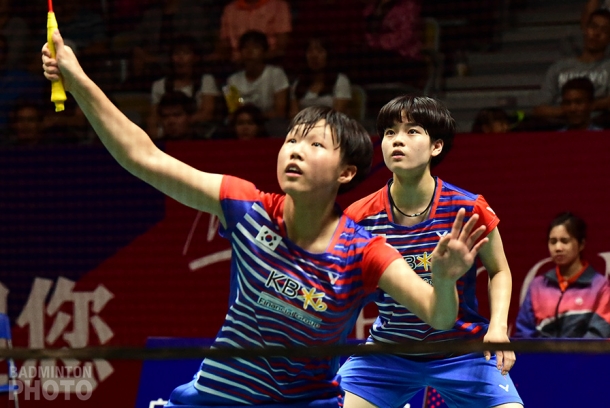

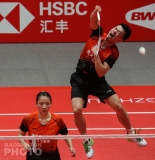

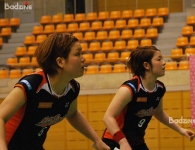
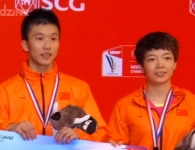
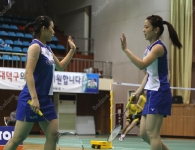
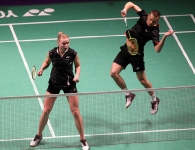
Leave a Reply